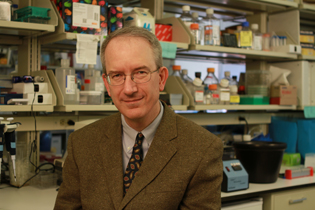Precision Medicine: Louis Staudt, NCI
Using Genomics to Get Patients the Right Treatment
More than a decade and about $3 billion were sunk into sequencing the first human genome. Now, that feat can be accomplished in as little as five days and runs about $4,000. The process is getting quicker and cheaper by the day. This reduction in the time and cost of genomic sequencing is the foundation of personalized medicine in which genetic analysis may point to the most effective treatment strategy.
“This is a particularly exciting time for us because we have tools that are just jaw-dropping in their power to examine the human genome,” Louis Staudt told the audience that had gathered at Suburban Hospital on November 1, 2013, for the first talk in the 2013–2014 Genomics in Medicine Lecture Series.

RICH FOLKERS, NCI
Louis Staudt, the director of NCI’s Center for Cancer Genomics, described how molecular tools can distinguish genetic differences in cancer subtypes and lead to better diagnoses and treatment.
Staudt, director of the National Cancer Institute’s (NCI) Center for Cancer Genomics and co-chief of NCI’s Center for Cancer Research Lymphoid Malignancies Branch, studies the molecular basis of human lymphoid malignancies. In his talk, “Practicing Precision Medicine in Cancer Using Genomics,” he described how molecular tools that probe DNA and RNA expression can be used to more accurately diagnose various cancer subtypes and identify genetic abnormalities that can make some patients’ tumors respond better than others to specific cancer-fighting drugs.
One example cited by Staudt of the need for accurate diagnosis comes from a study of endometrial cancer by researchers in The Cancer Genome Atlas project at NCI (Nature 497:67–73, 2013). The conventional tool for diagnosing the four major subtypes of endometrial cancer is histological analysis, in which biopsied tissue is stained and visually analyzed. Unfortunately, this method may result in the more aggressive serous-like subtype being misdiagnosed as a less aggressive subtype, resulting in inadequate treatment. Molecular tools, however, can easily distinguish these subtypes so patients can be treated appropriately. “The current ways that we’re diagnosing cancer and treating cancer are changing before our eyes,” said Staudt. “We’re moving from histological diagnosis to genomic diagnosis as fast as we can.”
In his own research, Staudt has used gene-expression profiles to differentiate two previously unknown subtypes of diffuse large B-cell lymphoma (DLBCL), which kills 10,000 people in the United States annually. The two subtypes, ABC and GCB, are characterized by elevated expression in distinct subsets of genes; the ABC subtype accumulates mutations that activate the B-cell receptor-signaling pathway.
Staudt worked with his NCI colleague Wyndham Wilson (NCI) to evaluate the B-cell signaling inhibitor ibrutinib in patients with ABC DLBCL. In a pilot study conducted at the NIH Clinical Center, they observed complete and partial responses in patients whose tumors were resistant to chemotherapy. Based on these findings, Staudt and Wilson led a multicenter phase 2 trial of 70 patients with refractory DLBCL: Patients with the ABC subtype had a 40-percent response rate compared to only five percent in patients with the GCB subtype. Staudt noted that the beneficial effect of ibrutinib and other targeted therapies relies critically on “the distinction between molecular subtypes of cancer.”
Staudt predicted that “Genetic profiling will become so inexpensive that patients will get it [in the] course of their standard care.” He envisions that one day soon, he’ll be performing more “non-clinical-trial clinical trials” by crunching the genetic data from patient tumors—potentially millions of them—to divine detailed molecular signatures of cancer subtypes that can each be treated with targeted therapies. “Until we study the great diversity of cancer,” he said, “we can’t fully appreciate its nature.”
The Genomics in Medicine Lecture Series is a collaboration of the National Human Genome Research Institute, Suburban Hospital (Bethesda, Md.), and Johns Hopkins University School of Medicine (Baltimore). The lectures are held on the first Friday of the month, 8:00–9:00 a.m., in the lower level auditorium of Suburban Hospital. All are welcome to attend. For more information, including how to watch archived videos of the presentations, go to http://www.genome.gov/27553517.
This page was last updated on Wednesday, April 27, 2022
